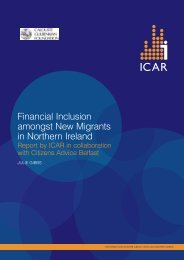Uncovered: assessing media and communications needs ... - ICAR
Uncovered: assessing media and communications needs ... - ICAR
Uncovered: assessing media and communications needs ... - ICAR
- No tags were found...
Create successful ePaper yourself
Turn your PDF publications into a flip-book with our unique Google optimized e-Paper software.
2 LITERATURE REVIEW2.1 The overall pictureDespite the dearth of literature specifi cally related to <strong>media</strong> training <strong>needs</strong>, reports relating to thetarget groups highlight issues that may be relevant to this study.Much of the literature has been prompted by crises affecting particular groups. Where the <strong>media</strong> ismentioned it is often in relation to a ‘top-down’ response to such crises. For example, the BradfordRace Review, responding to concerns about deteriorating race relations, found that ‘<strong>communications</strong>,information <strong>and</strong> dialogue, led by public institutions must improve to prevent perpetuation ofmisconceptions <strong>and</strong> perceptions held by communities about each other’ 3 . The Burnley Task Force,set up following so-called race riots, recommended: ‘local organisations <strong>and</strong> agencies shouldseek to communicate effectively with the local <strong>media</strong> <strong>and</strong> the local population in order to addressmisconceptions in a proactive way.’ 4Research by the Institute for Public Policy Research (ippr) into the integration of new migrantcommunities concluded that local authorities should proactively work to inform local communitiesbetter about the impacts of new migrant communities, <strong>and</strong> work more closely with the local <strong>media</strong> todispel myths <strong>and</strong> ensure more balanced coverage 5 .Most of these examples speak of these populations as more or less passive recipients ofcommunication, rather than active participants in the process. Other work by ippr 6 <strong>and</strong> the InformationCentre about Asylum <strong>and</strong> Refugees (<strong>ICAR</strong>) 7 focuses on the impact of <strong>media</strong> <strong>and</strong> communication onrefugees <strong>and</strong> asylum seekers, with <strong>ICAR</strong>’s Reporting Asylum recommending that the Governmentensure that the role of the <strong>media</strong> is central to its integration policies, <strong>and</strong> that opportunities areprovided for refugees to play an active role in domestic political life.The Refugees, Asylum-Seekers <strong>and</strong> the Media (RAM) project ran a series of events to explorerelations between those groups <strong>and</strong> the <strong>media</strong> <strong>and</strong> produced a report, compiled for <strong>ICAR</strong> by NissaFinney 8 . These events revealed how little each understood the others’ working culture, <strong>needs</strong> <strong>and</strong>expectations. They also found asylum seekers <strong>and</strong> refugees to be suspicious of journalists <strong>and</strong>needing support from people who underst<strong>and</strong> how the <strong>media</strong> works. The report suggested refugees<strong>and</strong> asylum seekers should be encouraged to work more directly with the <strong>media</strong>, to become moreprominent, reliable <strong>and</strong> respectable sources of information <strong>and</strong> quotes.Research by the Islamic Human Rights Commission 9 found that many Muslims feel the <strong>media</strong> doesnot give them enough opportunity to represent themselves, <strong>and</strong> that when it does the voices arethose who hold extremist views or st<strong>and</strong> at the margins of Muslim society. Others reported thatMuslims are only given an opportunity to speak when something negative happens, with the resultthat they are always seen to be ‘on the defensive’.More recently the Greater London Authority produced a report about Muslims <strong>and</strong> the <strong>media</strong> whichclaimed that in “one typical week in 2006, over 90 percent of the <strong>media</strong> articles that referred to Islam<strong>and</strong> Muslims were negative” 10 . The report makes suggestions about the role news organisations canplay in more fairly portraying Islam <strong>and</strong> Muslims. In the foreword to the report, then Mayor of LondonKen Livingstone calls for increased Muslim representation in the <strong>media</strong>.3 http://www.bradford2020.com/pride/4 http://image.guardian.co.uk/sys-fi les/Guardian/documents/2001/12/11/Burnleytaskforce.pdf5 http://www.cre.gov.uk/downloads/newmigrantcommunitiesresearch.pdf6 http://www.ippr.org.uk/research/teams/project.asp?id=2107 <strong>and</strong> tID=88 <strong>and</strong> pID=21077 http://www.icar.org.uk/?lid=105838 The British Media <strong>and</strong> Muslim Representation: http://www.ihrc.org.uk/fi le/1903718317.pdf9 The search for common ground – Muslims, non-Muslims <strong>and</strong> the UK <strong>media</strong>:10 http://www.london.gov.uk/mayor/equalities/docs/commonground_report.pdf14 <strong>Uncovered</strong>: <strong>assessing</strong> <strong>media</strong> <strong>and</strong> <strong>communications</strong> <strong>needs</strong> <strong>and</strong> capacity of marginalised communities
















